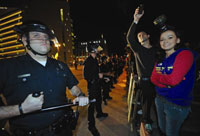Office of Research & Development |
 |


Police academy recruits who showed the greatest rise in the stress hormone cortisol after waking up in the morning were more likely to show acute stress symptoms in response to trauma years later as police officers, according to a study by researchers at the San Francisco VA Medical Center, the University of California, San Francisco and New York University Langone Medical Center. The results were published in the December 2011 issue of Biological Psychiatry.
The study is one of the largest yet to identify a possible way of predicting vulnerability to stress during and after a traumatic event, says lead author Sabra Inslicht, PhD, a psychologist with VA and an assistant adjunct professor of psychiatry at UCSF.
For the study, the researchers measured cortisol levels in 296 police recruits when they awakened, and then 30 minutes later. The difference between the two levels is known as cortisol awakening response, or CAR. After one, two, and three years of active service as police officers, the participants were then assessed for stress reactions in response to duty-related traumatic events.
"When we wake up in the morning, we all have a rise in cortisol as part of the normal awakening process that helps mobilize our body to start the day," says Inslicht. "In this study, the stronger a recruit's CAR, the greater the chance they would have stress symptoms years later in response to trauma."
A stronger CAR predicted two specific stress responses: dissociation—a feeling of dreamlike unreality during the traumatic event; and acute stress disorder (ASD) soon after the event. ASD symptoms include intrusive memories of the event, increased heart rate, faster breathing and conscious avoidance of thoughts or feelings related to the event. "These are symptoms of posttraumatic stress disorder, but limited to a shorter time frame," says Inslicht. She notes that many people with ASD go on to develop PTSD.
The current study, however, found no direct link between stronger CAR and full-blown PTSD. The authors cite a few reasons why this could be. For example, self-selection and rigorous screening before acceptance into the police academy may have resulted in a more resilient study population to begin with.
The authors emphasized in their paper the importance of re-examining the same officers later in their careers, and replicating the study in a civilian population.
The study results are potentially significant for military recruits, adds Inslicht. "It's very possible that the same vulnerability that we see in this subset of police officers may help predict which Veterans develop stress symptoms after a traumatic event," she says.
She cautions that the work is still at a very early stage. "While more research is needed to understand these mechanisms, the ultimate goal would be to develop interventions to prevent and treat some of the stress responses that we see—or at least ways of identifying people who may be at higher risk of PTSD and would thus benefit from getting interventions earlier on."
Other VA-affiliated authors on the study included Shannon E. McCaslin, PhD; Brigitte A. Apfel, MD; Thomas Metzler, MA; and Thomas C. Neylan, MD, in San Francisco; and Rachel Yehuda, MD, of Mount Sinai School of Medicine and the Bronx VA Medical Center.